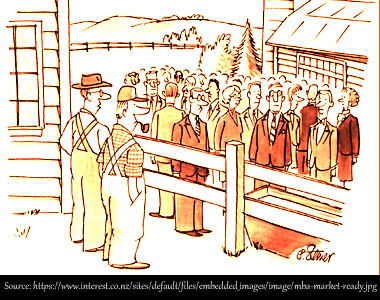A story was once shared of a blind girl who hated herself just because she was blind. She hated everyone, except her loving boyfriend. He was always there for her. She said that if she could only see the world, she would marry her boyfriend.
One day, someone donated a pair of eyes to her and then she could see everything, including her boyfriend. Her boyfriend asked her, “now that you can see the world, will you marry me?”
The girl was shocked when she saw that her boyfriend was blind too, and she refused to marry him. Her boyfriend walked away in tears, and later wrote a letter to her saying:
“Just take care of my eyes dear.”
The caveat ‘It is all about interest’ seem true after all.
The shortest and best way to make your fortune is to let people see that it is in their interests to promote yours.
I often hear people say that employers pay employees just enough to keep them on the job, and on the other hand, another school of thought opined that employees stay on the job so l ong as to gather enough capacity to move to a better job elsewhere. The irony of these two schools of thought is that both parties (consciously or unconsciously) hide this real intent of their hearts from the each while doing everything possible to make the other party believe that they actually have their best interest at heart.
ong as to gather enough capacity to move to a better job elsewhere. The irony of these two schools of thought is that both parties (consciously or unconsciously) hide this real intent of their hearts from the each while doing everything possible to make the other party believe that they actually have their best interest at heart.
Just like the simple interest theory of money, in exchange for the temporary use of a lender’s money, a borrower pays a fraction of the account balance back to the lender in addition to the principal amount. This fractional payment is known as interest. The borrower on the other hand uses the borrowed fund for some sort of interest of which the pre-determined economic benefit is a lot more than the interest to be paid to the lender.
However, the irony of this simple interest is in the question, ‘is actually the total amount received at a later time on the lent fund really at a higher benefit to the lender considering the economic activities of the time-value of money such as inflation rate, opportunity cost e.t.c.? If I am to invest $1Million at an interest rate of 10% per annum, at the end of the year I should be receiving $1.1Million but however if there is an inflation rate of 15% in that year, my supposed $1.1m is actually discounted by 15% which gives me $956,522 which is actually lower than my original money. Note that this is even without considering other economic factors that would have come into play within the specified period. The question is, where does interest really lie in all of these?
I have also come to realize that pursuing your interest early in life might be well worth the risk because rising early makes the road short
Back to our focus, as an employer or the boss, if you really want to influence people’s motivation, you have to uncover their real interest in doing things. You have to question their purposes and their causes. People aren’t going to be truly motivated for your own reasons and objectives. Employees ask themselves, “What’s in it for me both in the short and long run?” Knowing this upfront helps you to determine what your employees’ real motives are, and then help them connect those motives to your organization’s goals and activities. When you do this, you also will be positively affecting each worker’s performance on the job. Likewise the employee, if you really want to protect your own interest you’ve got to truly buy into your employer’s interest so as to align it with yours.
And like Jean de La Bruyere, the 17th-century French Writer said, “The shortest and best way to make your fortune is to let people see that it is in their interests to promote yours”. By looking out for your people and their best interests, your employees also will begin to see that looking out for others and the organization as a whole is how they ultimately look out for themselves. Sure, it can take some time for this to happen, but if you persist, people will see the light and it will be worth the wait.
Many people stay on the job not just about the money, top performers want to work in a pleasant and progressive environment where they feel valued and respected. Money is secondary in some cases. Mary Kay Ash, the founder of Mary Kay Cosmetics once said, “There are two things people want more than sex and money… recognition and praise.”
And a word for thought; I have also come to realize that pursuing your interest early in life might be well worth the risk because rising early makes the road short.
Olusegun Alade
Principal Partner,
Michael Alade & Co. (Chartered Accountants)


